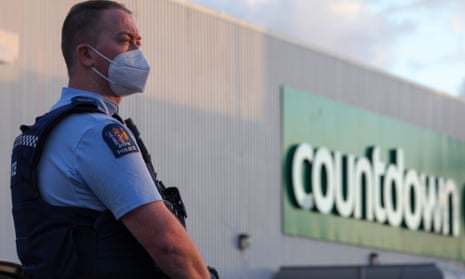New Zealand: rushing anti-terror law could lead to surveillance overreach, minor parties say.
The law will make planning a terrorist attack a crime, closing a loophole that meant authorities could not act against the Auckland supermarket attacker
Legislation that will make planning a terrorist attack a crime in New Zealand is one step closer to becoming law, but the country’s minor parties have voiced concerns the process is moving too fast and could lead to state surveillance overreach.
The government has fast-tracked the Counter-Terrorism Legislation bill, which aims to close the legal loophole around planning an attack, following the Islamic State-inspired terrorist attack in Auckland earlier this month.
The country had tried for years to deport Ahamed Aathil Mohamed Samsudeen, a 32-year-old Sri Lankan man who was shot dead by police on 3 September after an attack at a supermarket in Auckland. Eight people were hurt in the attack, five of them with stab wounds.
The day after the attack, the prime minister, Jacinda Ardern, vowed to pass the law by the end of September. The bill passed its second reading in parliament on Tuesday.
New Zealand must foster belonging for all refugees in wake of terror attackRead more
Speaking to the house, the minister for justice, Kris Faafoi, said the impacts of the attacks on New Zealand had been immense and the government must do everything it could to try to prevent more from happening.
“It provides our enforcement agencies with clear legal authority to disrupt terrorism-related activity, and hopefully before it occurs,” Faafoi said.
“But I do want to acknowledge that it is crucial the powers in this bill are not used disproportionately against any group of New Zealanders.”
The National Party supported the bill. Its leader Judith Collins said: “If we need changes to terrorism legislation, it certainly is now.”
But the Green party, ACT and Te Pāti Māori (the Māori party) all opposed the bill.
Te Pāti Māori’s co-leader Debbie Ngarewa-Packer told RNZ the party has huge empathy for the victims of terrorism.
But she noted that such legislation has historically been used against Māori, such as the Tūhoe raids and Parihaka.
The Tūhoe raids in 2007, dubbed Operation 8, were the result of New Zealand’s largest domestic anti-terror operation, involving 300 police officers.
It was the country’s most controversial counter-terrorism operation, which saw police raid the Ngāti Tūhoe tribe after alleging they were running terrorist training camps. The Tūhoe said in their defence that the camp had been focused on bushcraft, hunting, and bootcamp-style training to get people off government benefits.
In court, the police case eventually crumbled: none of the 18 people arrested faced charges under the Terrorism Suppression Act, after the solicitor-general ruled that the evidence was insufficient.
The Green party’s Teanau Tuiono said the party could not support the bill because more work must be done to protect human rights.
“Planning or preparation offence has been characterised by some experts as thought crimes – difficult to define in practice or defend against in legal proceedings,” Tuiono said.
“The warrantless search and seizure powers that sit with this offence make the risks for human rights abuses even more significant.”
Tuiono said the bill conferred broad powers to agencies that could lead to disproportionate surveillance and criminalisation.
The ACT party’s Nicole McKee also opposed the bill, for fears that the finer points of murky law were being rushed.
“I hope that during the select committee process we actually manage to capture all of the concerns raised, but we are now restricted by a shortened time frame and the ability to garner feedback from those communities on our changes.”
The bill was originally introduced in April as a direct response to New Zealand’s worst mass shooting and terrorist attack: the March 2019 attack on two mosques in Christchurch, where a white supremacist gunman murdered 51 people.
A royal commission in the aftermath of the attacks recommended a number of changes, including updates to terror legislation.
The new laws will criminalise planning or preparing for a terror act, even if there is no attempt to carry one out. They also criminalise weapons training or combat training for terrorist purposes, and give the police warrantless powers of entry, search and surveillance when suspecting someone of planning an attack.
… as you’re joining us today from New Zealand, we have a small favour to ask. Tens of millions have placed their trust in the Guardian’s fearless journalism since we started publishing 200 years ago, turning to us in moments of crisis, uncertainty, solidarity and hope. More than 1.5 million supporters, from 180 countries, now power us financially – keeping us open to all, and fiercely independent.
Unlike many others, the Guardian has no shareholders and no billionaire owner. Just the determination and passion to deliver high-impact global reporting, always free from commercial or political influence. Reporting like this is vital for democracy, for fairness and to demand better from the powerful.
And we provide all this for free, for everyone to read. We do this because we believe in information equality. Greater numbers of people can keep track of the events shaping our world, understand their impact on people and communities, and become inspired to take meaningful action. Millions can benefit from open access to quality, truthful news, regardless of their ability to pay for it.




